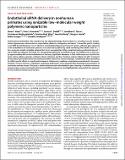Endothelial siRNA delivery in nonhuman primates using ionizable low–molecular weight polymeric nanoparticles
Author(s)
Khan, Omar Fizal; Doloff, Joshua C; Tsosie, Jonathan; Bakthavatchalu, Vasudevan; Bodi Winn, Caroline M; Haupt, Jennifer; Jamiel, Morgan; Langer, Robert S; Anderson, Daniel Griffith; Kowalski, Piotr S; ... Show more Show less
DownloadPublished version (2.241Mb)
Terms of use
Metadata
Show full item recordAbstract
Dysfunctional endothelial cells contribute to the pathophysiology of many diseases, including vascular disease, stroke, hypertension, atherosclerosis, organ failure, diabetes, retinopathy, and cancer. Toward the goal of creating a new RNA-based therapy to correct aberrant endothelial cell gene expression in humans, efficient gene silencing in the endothelium of nonhuman primates was achieved by delivering small interfering RNA (siRNA) with 7C1, a low–molecular weight, ionizable polymer that forms nanoparticles. After a single intravenous administration of 1 mg of siRNA per kilogram of animal, 7C1 nanoparticles delivering Tie2 siRNA caused Tie2 mRNA levels to decrease by approximately 80% in the endothelium of the lung. Significant decreases in Tie2 mRNA were also found in the heart, retina, kidney, pancreas, and bone. Blood chemistry and liver function analysis before and after treatment all showed protein and enzyme concentrations within the normal reference ranges. Furthermore, after controlling for siRNA-specific effects, no significant increases in inflammatory cytokine concentrations were found in the serum. Similarly, no gross lesions or significant underlying pathologies were observed after histological examination of nonhuman primate tissues. This study is the first demonstration of endothelial gene silencing in multiple nonhuman primate organs using systemically administered siRNA nanoparticles and highlights the potential of this approach for the treatment of disease in humans.
Date issued
2018-06Department
Massachusetts Institute of Technology. Department of Chemical Engineering; Massachusetts Institute of Technology. Division of Comparative Medicine; Harvard University--MIT Division of Health Sciences and Technology; Massachusetts Institute of Technology. Institute for Medical Engineering & Science; Massachusetts Institute of Technology. Department of Biological Engineering; Koch Institute for Integrative Cancer Research at MITJournal
Science Advances
Publisher
American Association for the Advancement of Science (AAAS)
Citation
Khan, Omar F. et al. "Endothelial siRNA delivery in nonhuman primates using ionizable low–molecular weight polymeric nanoparticles." Science Advances 4, 6 (June 2018): eaar8409 © 2018 The Authors
Version: Final published version
ISSN
2375-2548